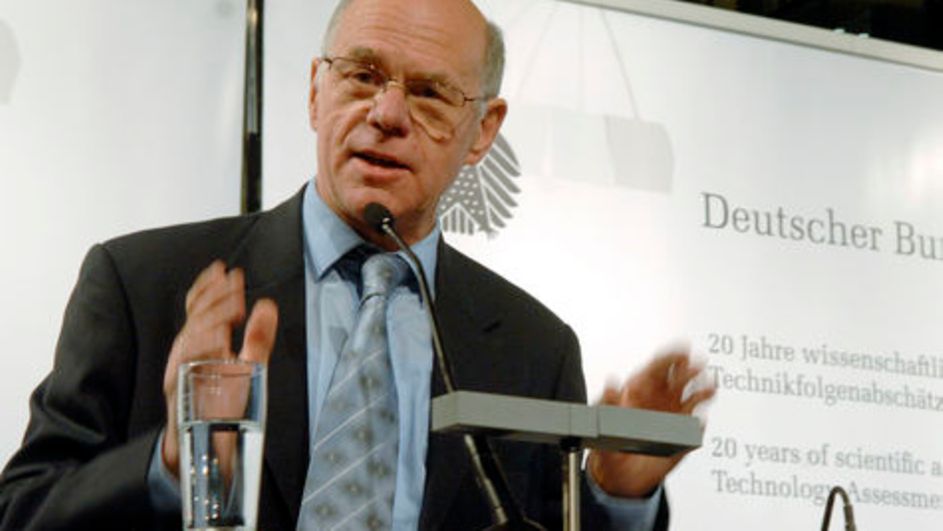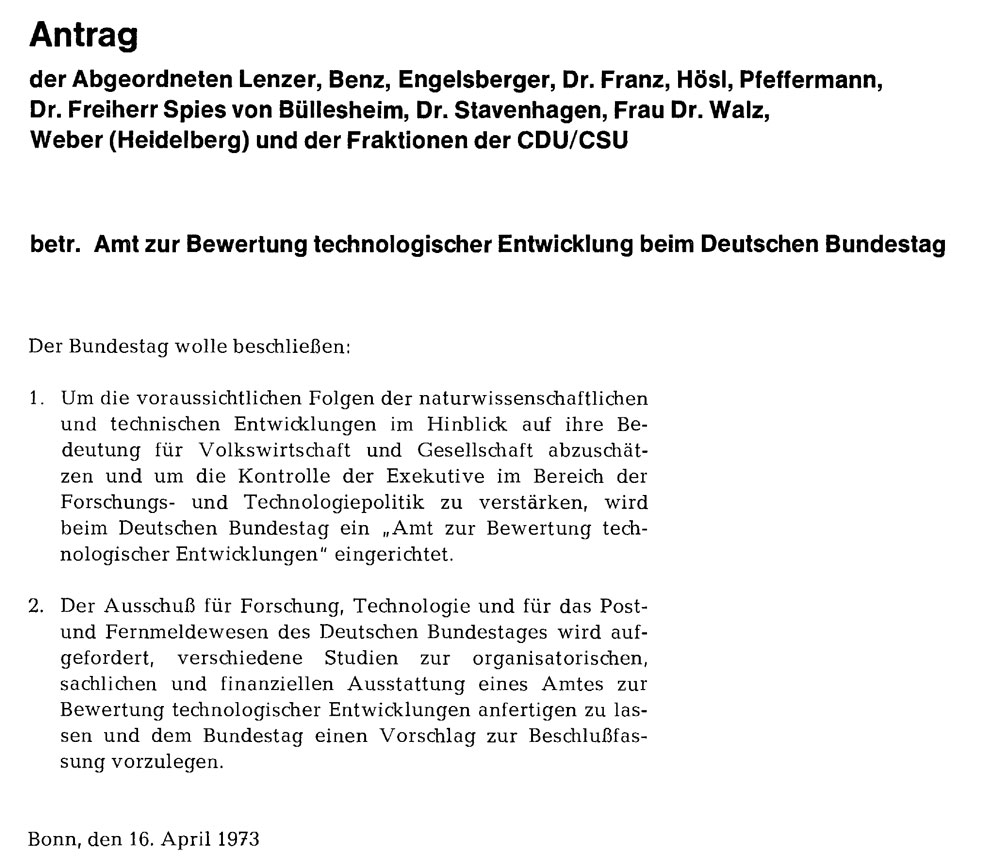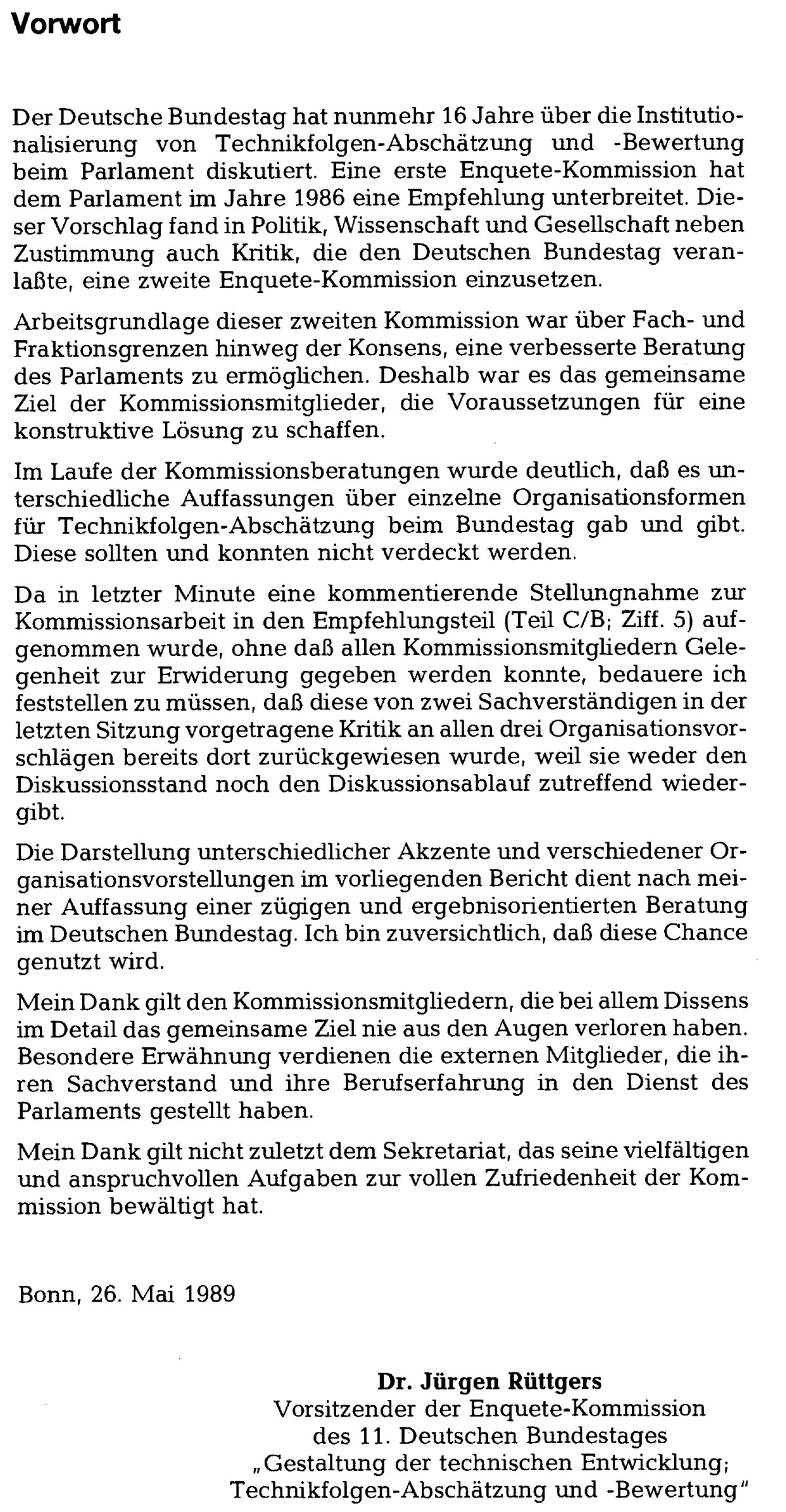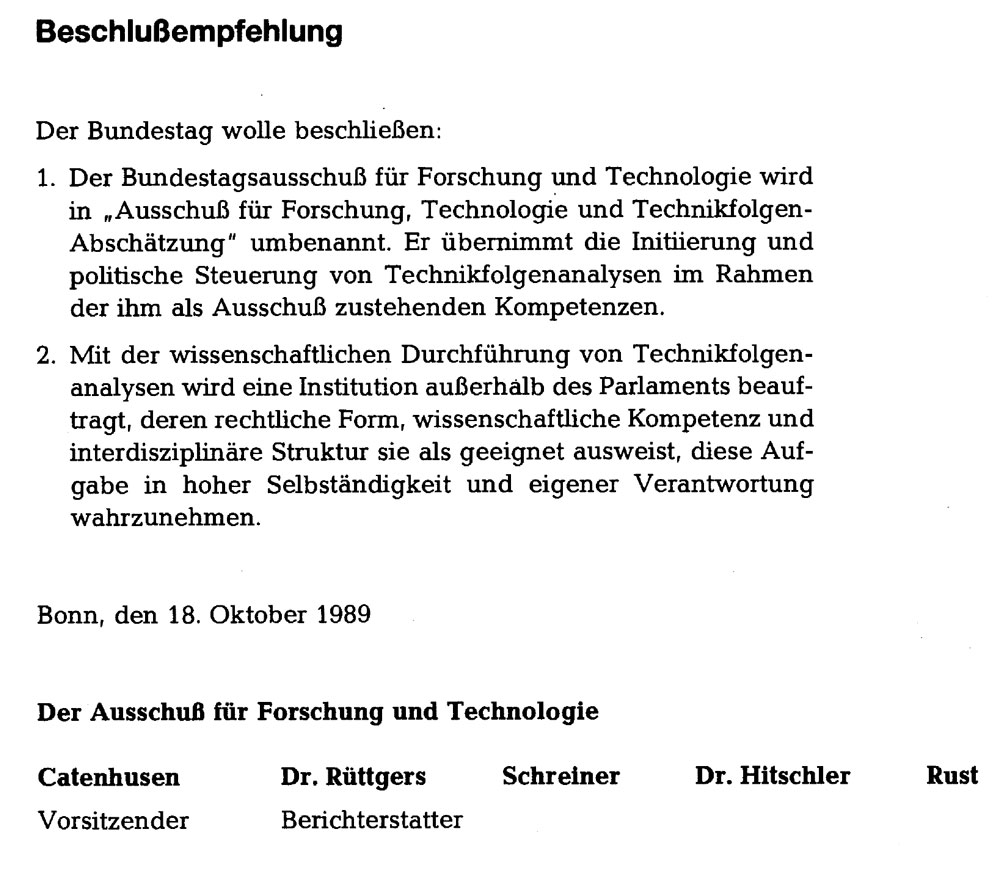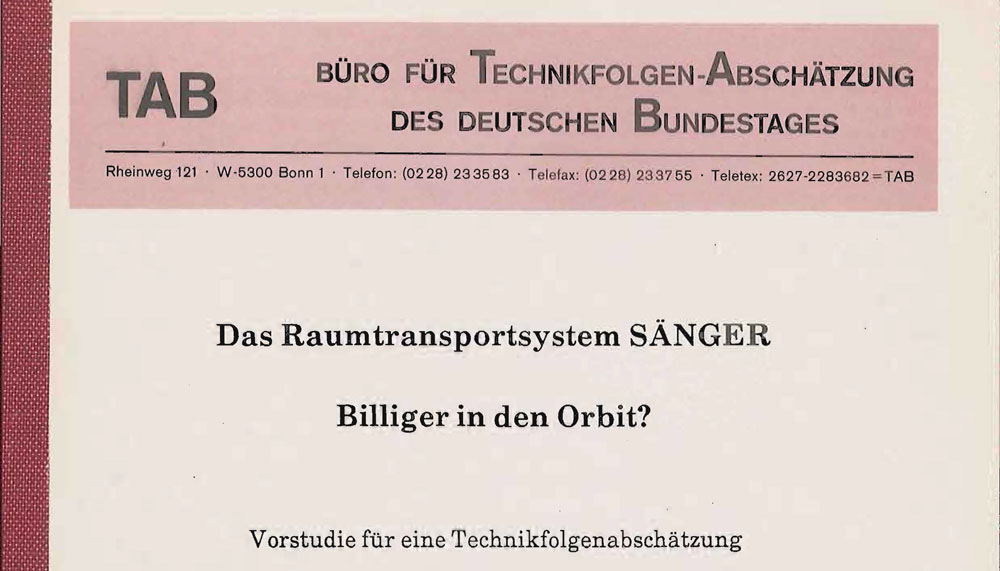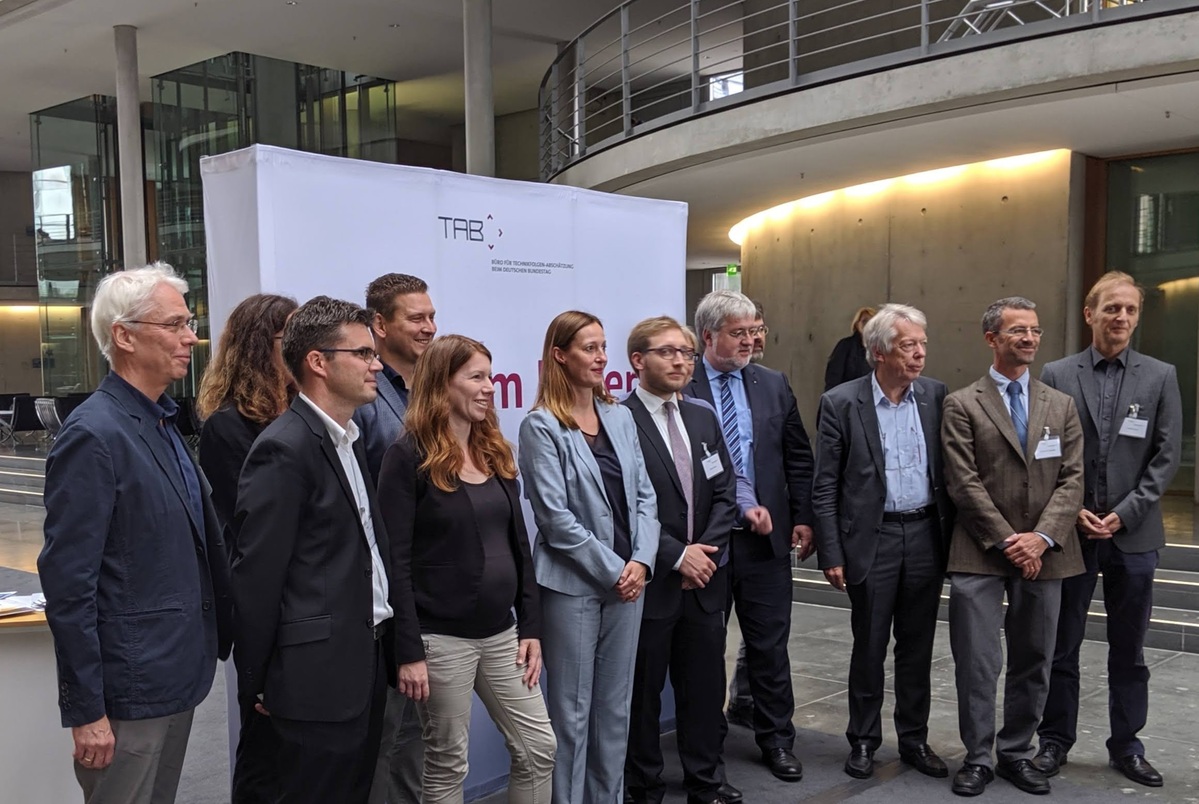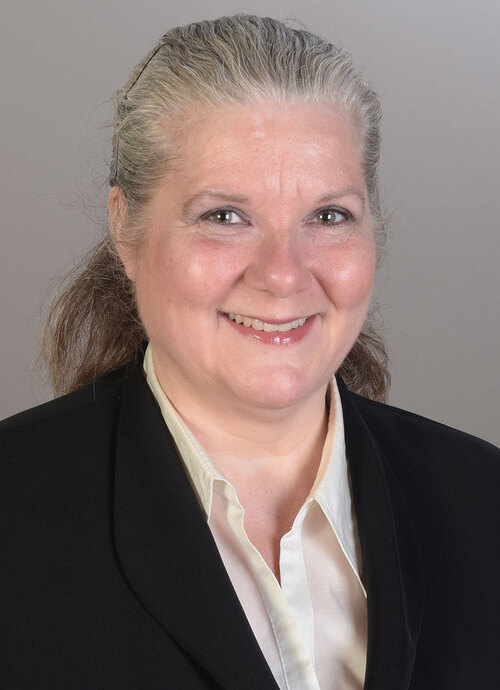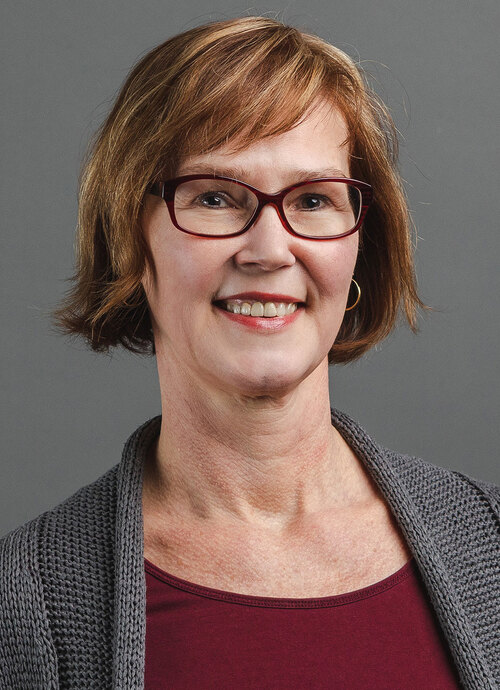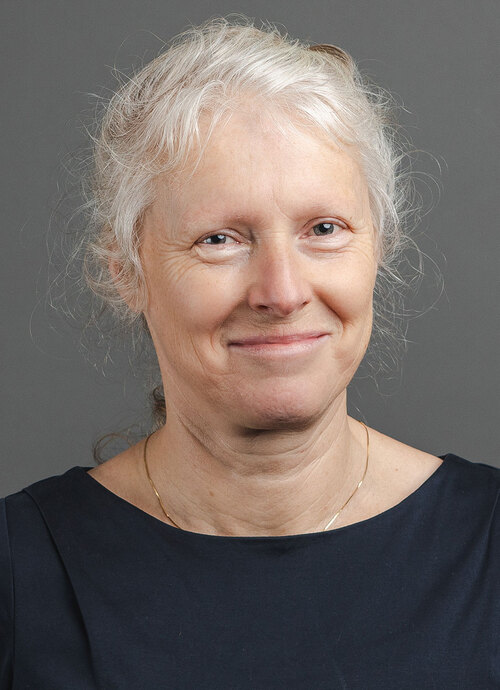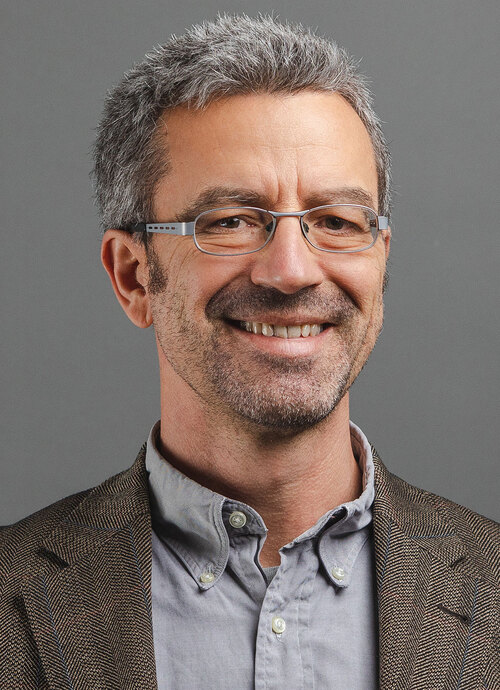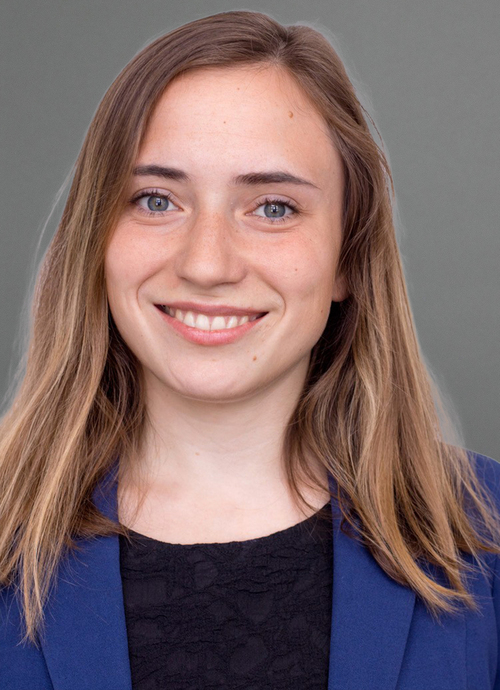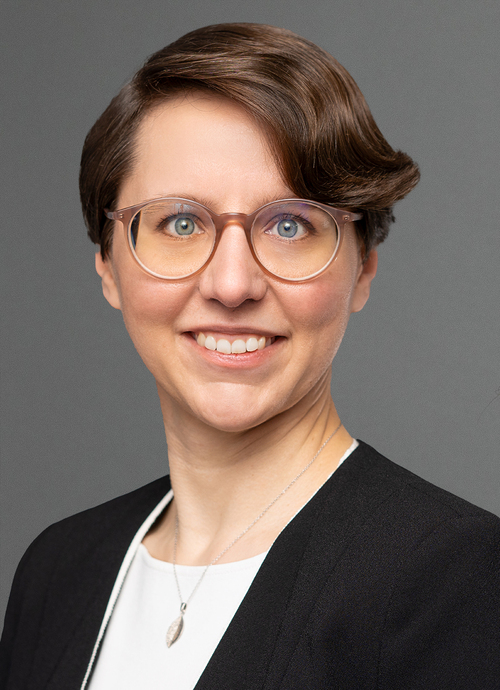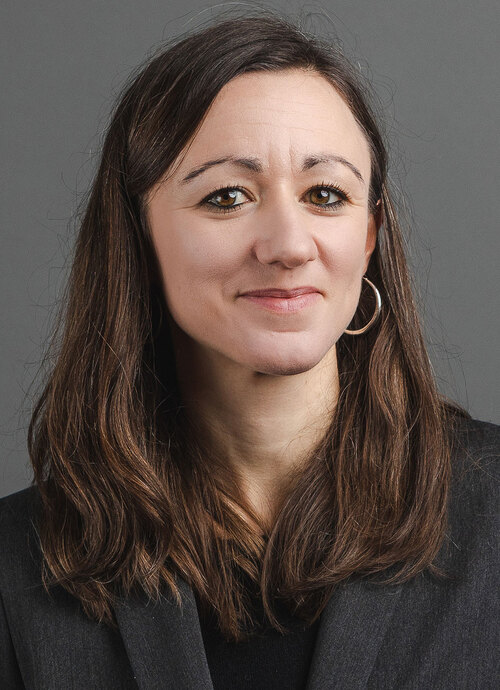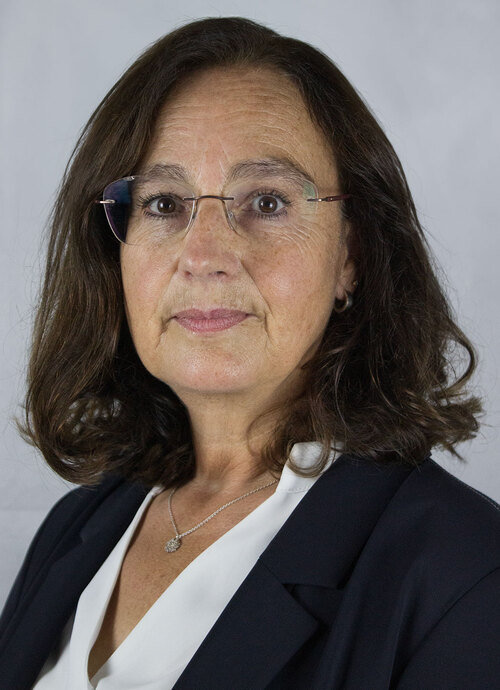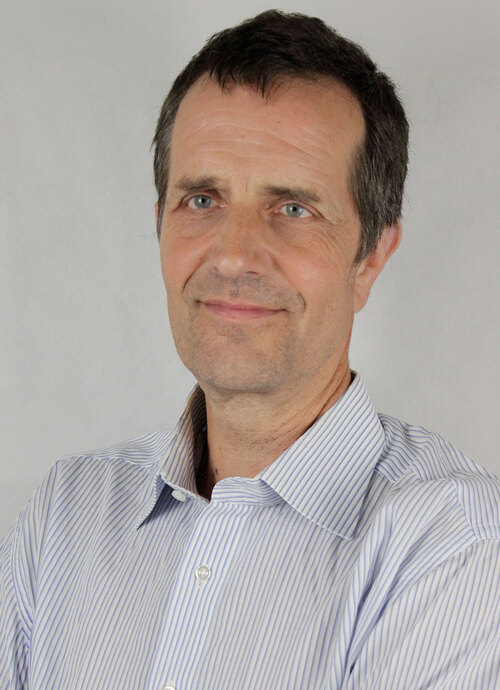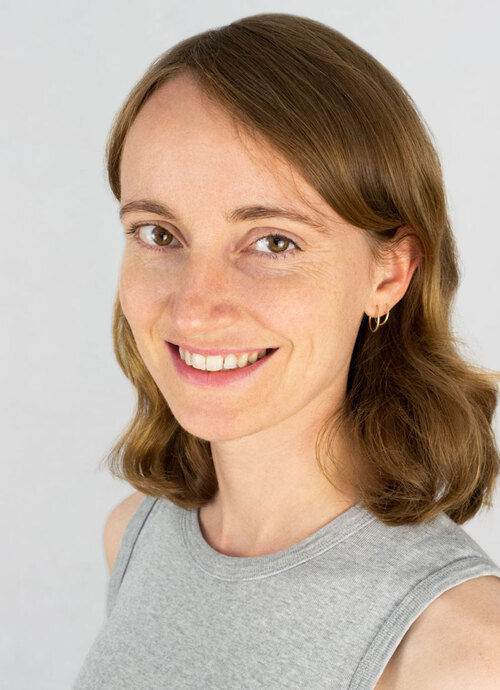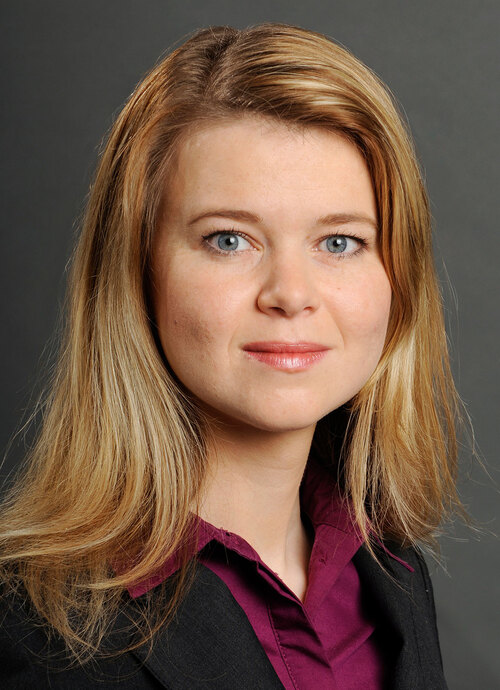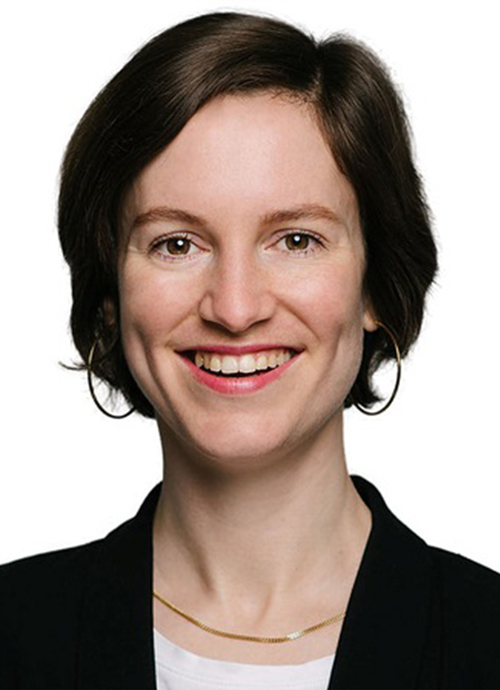About us
The Office of Technology Assessment at the German Bundestag (TAB) is an independent scientific institution that has been advising Parliament and its committees on issues of scientific and technological change since 1990.
Tasks and goals
Assessing the consequences of technology – for parliament and society
TAB's tasks include the conception and implementation of technology assessment projects (TA projects) and - in preparation and as a complement to these - the observation and analysis of important scientific and technological trends and related societal developments.
The catalogue of tasks also includes the observation of scientific and technological trends in early stages of development (horizon scanning), the exchange of experience and opinions with societal actors through systematic discourse analyses and dialogue procedures, and the strengthening of international parliamentary TA in Europe and beyond. (Fields of activity)
The aims of parliamentary TA are
- to analyse the potentials and effects of scientific and technological developments comprehensively and forward-looking and to explore the associated social, economic and ecological opportunities and risks,
- to examine the framework conditions for scientific and technological innovations,
- to provide a dialogue forum for society and politics to discuss and assess scientific and technological developments
- and, on this basis, to identify the Parliament's need for and options for action
By providing impartial analyses, TAB enhances the information available to the German parliament, offering a scientific foundation for forming opinions and engaging in debate about technological developments and innovations within parliament and society.
TAB has so far carried out more than 200 projects and published the results in over 400 publications.
Client and addressees
The client and first addressee of our work is the German Bundestag.
According to §56a of the Procedural Rules of the German Bundestag, the Committee on Research, Technology, Space and Technology Assessment is responsible for political steering in the newly elected Parliament. During each legislative period, the committee establishes a permanent TA rapporteurs group comprising one member from each parliamentary party in the Bundestag. This group prepares all committee decisions, such as the work programme and acceptance of work results, in regular consultation with TAB. The Committee's secretariat facilitätes communication between TAB and the bodies and members of the German Bundestag.
»Technology Assessment is more important than ever before [...] The great challenges of our time can only be managed by dialog between politics and science.«
Kai Gehring, Chairman of the German Bundestag’s Committee on Education, Research, and Technology Assessment opening the EPTA-Conference 2022
Specialised Committees, plenary of the Parliament and the general public
All of the Bundestag's specialist committees play an important role in our parliamentary work. They submit specific topics for investigation to the TAB and discuss the reports presented at their meetings. The representatives of the parliamentary groups then debate these reports in plenary sessions.
All of the TAB's work is published and freely accessible in the form of Bundestag printed papers and/or TAB publications.
Through our reader-friendly summaries, such as our policy-brief TAB-Fokus, we aim to contribute to social dialogue on scientific and technical innovations in public authorities, companies, universities, and other research and educational institutions, as well as in everyday settings like the kitchen table and social networks.
»I expect a qualified contribution from parliamentary technology assessment to a sober as well as future-oriented processing and evaluation of all implications of artificial intelligence, robotics, autonomous systems, big data, blockchain etc. The boundless hype surrounding these new technological possibilities must be transformed into a factual debate, also through the scientific methodology of TA.«
E. D. Rossmann, TAB-Brief Nr. 49 (2018): Erwartungen an die TA im 19. Deutschen Bundestag, S. 5
Consensus-oriented topic identification in the Bundestag
Proposals to conduct an investigation can be made by all committees and parliamentary groups of the German Bundestag (also jointly).
For each topic proposal, the TAB submits a statement on the question of its scientific feasibility as well as further considerations on the objectives, contents and methods of a possible project.
Under the guidance of the committee chairperson, the rapporteur group for TA discusses the factual, political and social relevance of the proposed topics with the TAB representatives. On this basis, the topics to be investigated are selected by consensus and submitted to the ABFTA for decision.
Despite the cross-sectional nature of many of the technologies and issues to be analysed, looking back on more than 30 years of parliamentary TA, thematic focal points can be identified: Biotechnologies and Health, Digital Society and Economy, Energy and Environment, Infrastructures and Security, and Agriculture and Food.
Inter- or transdisciplinary and collaborative implementation
Following the decision by the ABFTA, the TAB is responsible for the scientific processing and management of the projects. At the beginning, the respective project team conducts intensive research and expert discussions on relevant research questions and results. These also serve to identify and adress conflicting scientific opinions and controversial positions of various interest groups.
The TAB works scientifically in an interdisciplinary and transdisciplinary manner. The project team observes and evaluates current scientific discussions as well as topic-related public and political debates throughout the entire duration of the project. For central questions of a TA or monitoring project, the TAB proposes to the ABFTA the assignment of expert opinions to external experts or scientific institutions. The cooperation with the external experts and the evaluation of the expert opinions form a core part of the project work. Workshops and expert discussions are held in the Bundestag to discuss interim results. Frequently, research organisations, companies, civil society groups, public authorities or citizens are also involved in the investigation process. In this way, communication between science, society and the German Bundestag as well as the transfer of knowledge and opinions can take place even before the projects are completed. The results of all activities are compiled by TAB and the project is concluded with a final report.
Approval and publication of the project results
The TA rapporteur group reviews and comments on the final reports from TA projects and short studies. The group then makes a recommendation to the ABFTA on whether to approve and publish the report as a Bundestag printed paper. Project results are often presented to the ABFTA or used as the basis for expert discussions in other specialist Bundestag committees. As a rule, all results are made freely available.
Content-related and institutional neutrality and independence
Content-related and institutional neutrality and independence are an essential cornerstone of the consulting services. All investigations are carried out in a comprehensible manner. Assumptions and value judgements are disclosed and justified, work results are presented in a reader-friendly and parliamentary-oriented manner - i.e. oriented towards the information needs and responsibilities of the German Bundestag. In performing their tasks for the Bundestag, the head and staff of TAB are not subject to any instructions from their employer or the Bundestag.
"It is important that the roles are clear. Science paves the way for our political decisions. Here in the Bundestag, TAB reports are commissioned and adopted by consensus of all parliamentary groups. Parliamentary discourse on technological innovation can therefore take place on a common factual basis."
Kai Gehring, Vorsitzender des Bundestagsausschusses für Bildung, Forschung und Technikfolgenabschätzung (im Interview mit der TATuP)
Working areas
TA projects
TA projects examine complex issues of scientific and technological development using a broad analytical approach. These topics may also have a pronounced cross-sectional character and be of long-term importance for society. The guiding principle of comprehensive sustainable development forms a central orientation for the analysis and assessment of scientific-technological, economic and social future potentials as well as the associated options for research and political action.
Short projects ("TA-Kompakt")
Upon decision of the TA Rapporteurs Group, TAB conducts studies with a short duration and smaller scope of the final reports (TA-Kompakt-Studien) in case of short-term information and consultation needs of the Parliament.
Monitoring
Relevant aspects of change in science, technology and society (e.g. state of research and development, regulation, international comparisons) and their possible impacts are examined in monitoring projects with a thematic focus.
Innovation analyses
Innovation analyses are concerned with areas where the innovation process is particularly dynamic in scientific-technical and social terms, where a high application potential can be expected, and which can therefore have a particularly strong influence on structural change in the economy, science and society.
Foresight
Horizon scanning/technology foresight is used to observe scientific and technological trends at an early stage of their development and to place them in the context of societal debates in order to identify innovation signals as early as possible and to assess their relevance. In addition, foresight activities include forward-looking analyses of potential vulnerabilities of infrastructure systems (Resilience radar) to enable the development of viable resilience strategies (Resilience check). The results of the Horizon Scanning, the Resilience Radar and the Resilience Check will be made available to the Rapporteur Group in the form of Thematic Brief Profiles, a Foresight Report and a Resilience Dossier.
Discourse analysis and dialogue with societal actors
Promoting public dialogue and facilitating the formation of opinion in society is an important part of parliamentary technology assessment. A systematic exchange of experiences and opinions with societal actors in the German Bundestag is particularly important for the identification and structuring of topics and the public discussion of the results. With the help of participatory discourse analyses, attitudes and debates on future needs and requirements for action are investigated in a representative manner, in order to be able to systematically consider societal needs and positions in TA studies. Selected empirical studies have been published in the TAB-Sensor series.
TA concepts and methods
The results of monitoring and participating in the ongoing national and international debate on TA issues, concepts and methods will be taken into account as appropriate in relevant TA work areas.
International cooperation
Participation and cooperation in the "European Parliamentary Technology Assessment Network" (EPTA) forms the basis for strengthening international parliamentary technology assessment in and beyond Europe.
»If the prerequisites, implications, values and interests of scientific expertise are disclosed, better decisions in politics will be made.«
E. D. Rossmann, TATuP 29 (1), 2020
Institutional integration
The TAB has been operating as an independet scientific unit at the Institute of Technology Assessment and Systems Analysis (ITAS) of the Karlsruhe Institute of Technology (KIT) since 1990. It is based on a contract with the German Bundestag.
The head of TAB is appointed by KIT in consultation with the Bundestag's Committee on Education, Research and Technology Assessment, which acts as the steering committee. Since 2002, the head of ITAS, Professor Dr. Armin Grunwald, has been scientifically for results of TAB's work and represents them to the German Bundestag.
Since September 2013, the KIT has been cooperating with the IZT - Institute for Futures Studies and Technology Assessment gGmbH and the Institute for Innovation and Technology (iit) within the VDI/VDE Innovation + Technik GmbH in the operation of TAB.
The TAB and its interdisciplinary team are located in Berlin.

Networking
TAB is a member of the European network of parliamentary TA institutions (EPTA Network) as well as of the German-speaking network Netzwerk TA (NTA). In addition, it is networked with thematically relevant scientific institutions and experts at home and abroad through its institutional integration and the many years of scientific and advisory practice of its staff.

EPTA
- Members' Project Database (1985 - now)
- Policy Briefs and Reports of the Members (1988 - now)
NTA
- Calendar of the openTA portal of the NTA: events of the TA network and other dates with TA relevance
- openTA publication Service brings together the publications of the cooperating NTA member institutions in a database and supplements them with further sources that have a TA-relevance
History of TA in the German Bundestag
The idea of providing ongoing technology assessment support to Parliament and its committees dates back to the 1970s. That decade was a time of intense and often contentious debate about the opportunities and risks of scientific and technological developments. Earlier technological optimism had given way to widespread scepticism. In addition, many problematic social and environmental consequences raised awareness of the need for early assessment and evaluation of technology development and use. One response to this challenge was the development of the concept of technology assessment (TA). The German Bundestag also debated the opportunities, risks and potential of new technologies. The discussion soon focused on whether and how TA could be used to support opinion-forming and decision-making processes. The Office of Technology Assessment established in the US Congress in 1972 was seen as a model in many respects.
The »institutionalization debate«
The institutionalisation debate started in 1973 with a motion by the then opposition, the Christian Democratic Union/Christian Social Union (CDU/CSU) parliamentary group, to establish an »Office for Evaluation of Technological Development at the German Bundestag« (Bundestagsdrucksache 7/468). In the next few years, this was followed by numerous proposals from the other parliamentary groups. An important milestone was the Study Commission on »Assessment and Evaluation of Technological Impacts; Design of the Framework Conditions of Technological Development«, which was set up in the 10th electoral period by joint decision of the parliamentary groups on 14 March 1985 (Bundestagsdrucksache 10/2937). After submitting a proposal on the »Institutionalisation of an advisory body for technology assessment and evaluation at the German Bundestag« in 1986, the Commission completed its work by the end of the electoral period with an interim report containing recommendations for the organisation of TA at the German Bundestag (Bundestagsdrucksache 10/5844).
The 11th German Bundestag again set up a Study Commission on technology assessment. Its task, among others, was to adopt the criticism of the institutionalisation model and to submit a new proposal for the establishment of TA in the German Bundestag. In its final report (Bundestagsdrucksache 11/4606), the Commission of Inquiry presented three different models for discussion and decision.
The CDU/CSU and FDP parliamentary groups suggested renaiming the Committee on Research and Technology to »Committee on Research, Technology and Technology Assessment«, which would be responsible for the initiation and political control of TA. An institution outside Parliament would be commissioned to conduct TA studies and carrying out »this task with a high degree of independence and responsibility«.
The parliamentary group of the SPD proposed to establish a committee for parliamentary technology advice as well as a scientific unit (about 15 members) within the German Bundestag. The committee and the scientific unit should be supported by a Board of Trustees appointed by the German Bundestag.
The parliamentary group of the Green Party voted for the establishment of a TA foundation foundation which would be headed by members of the German Bundestag and non-parliamentary experts to be elected by the General Assembly. Furthermore, an institute would be assigned to the foundation whose task would be to accompany TA studies and prepare them for the Parliament. Additionaly, a permanent scientific unit would be attached to the Presidium of the German Bundestag which would - besides other tasks - award TA studies to the foundation.
The establishment of a parliamentary advisory capacity for TA
On 16 November 1989, the German Bundestag voted by a majority of the CDU/CSU and FDP coalition partners to rename the "Committee on Research and Technology" the "Committee on Research, Technology and Technology Assessment" and to authorise a scientific institution to carry out technology assessment for the German Bundestag (Bundestagsdrucksache 11/5489). This paved the way for the establishment of a permanent institution.
On the justification for the establishment of a permanent scientific advisory capacity for the German Bundestag:
»The dynamics of technical progress is one of the basic prerequisites for the economic and social performance of our country, for securing our natural livelihoods and for solving global human problems.
However, new technologies can also have unintended and undesirable consequences for people and nature. The German Bundestag must help to exploit the opportunities of new technologies and reduce the risks. This includes both shaping the framework conditions of technical progress and participating in the social dialogue. The political debate on science and technology should reduce irrational attitudes and strengthen orientation and trust. To fulfil its tasks in this area, the German Bundestag makes use of various instruments, such as commissions of enquiry, hearings, the Scientific Service, which have basically proved their worth. However, in view of the new dimensions of what is technically feasible and the increasing pace of technological change, Parliament's need for information has increased. Therefore, a supplement to the existing instruments by a continuously usable advisory capacity is necessary.«
Source: Decision recommendation and report of the Committee on Research and Technology, Drs. 11/5489 vom 26. Oktober 1989, S.6
Institutional development of TAB since 1990
On 29 August 1990, following an invitation to tender and at the suggestion of the then Committee on Research and Technology, a contract was signed with the Karlsruhe Nuclear Research Centre for a three-year pilot phase and the Office of Technology Assessment at the German Bundestag (TAB) was established. Since then it has been run by the Institute for Technology Assessment and Systems Analysis (ITAS) - until 1995 the Department for Applied Systems Analysis (AFAS) - of the Karlsruhe Institute of Technology (KIT), a merger of the Forschungszentrum Karlsruhe and the University of Karlsruhe.
At the end of the pilot phase, the German Bundestag decided on 4 March 1993 to establish a permanent advisory institution "Technology Assessment (TA) at the German Bundestag" (Bundestagsdrucksache 12/4193). For the following two five-year periods (until August 2003), the (then) Karlsruhe Research Centre was commissioned to operate TAB on its own; from September 2003 to August 2013, it cooperated with the Fraunhofer Institute for Systems and Innovation Research (ISI), Karlsruhe, in accordance with a decision of the Committee for Research, Technology and Technology Assessment; from September 2013 to August 2018, it cooperated with the Helmholtz Centre for Environmental Research (UFZ), the Institute for Future Studies and Technology Assessment (IZT) as well as with VDI/VDE Innovation + Technik GmbH.
On 6 June 2018, and again on 21 June 2023, the Committee for Education, Research and Technology Assessment decided, following a call for tenders and a multi-stage application process, to entrust the Karlsruhe Institute of Technology with the operation of TAB for a further five years (until 31 August 2028), whereby it will continue to cooperate with the Institute for Futures Studies and Technology Assessment (IZT) and VDI/VDE Innovation und Technik GmbH (VDI/VDE-IT) in certain areas of activity.
Documents and Links (in German)
- Drs. 7/468 - Antrag: Amt zur Bewertung technologischer Entwicklung beim Deutschen Bundestag - 16.04.1973
- Drs. 10/2937 - Beschlussempfehlung und Bericht: zu dem Antrag der Fraktionen der CDU/CSU, FDP und der Fraktion DIE GRÜNEN - Drucksache 10/2383 - Technikfolgenabschätzung und -bewertung zu dem Antrag der Abgeordneten Roth, Vosen, Lutz, Catenhusen, Fischer (Homburg), Grunenberg, Hansen (Hamburg), Dr. Kübler, Nagel, Stahl (Kempen), Stockleben, Vahlberg, Buschfort, Dreßler, Egert, Glombig, Heyenn, Kirschner, Peter (Kassel), Reimann, Schreiner, Frau Steinhauer, Urbaniak, Weinhofer, von der Wiesche, Dr. Vogel und der Fraktion der SPD - Drucksache 10/2517 - Gestaltung der technischen Entwicklung; Technikfolgenabschätzung und -bewertung - 27.02.1985
- Drs. 10/5844 - Unterrichtung: Bericht der Enquete-Kommission "Einschätzung und Bewertung von Technikfolgen; Gestaltung von Rahmenbedingungen der technischen Entwicklung" gemäß Beschluß des Deutschen Bundestages vom 14. März 1985 - Drucksachen 10/2937, 10/3022 - Zur Institutionalisierung einer Beratungskapazität für Technikfolgen-Abschätzung und -Bewertung beim Deutschen Bundestag - 14.07.1986
- Drs. 11/4606 - Bericht und Empfehlung: Zur Notwendigkeit und Ausgestaltung einer ständigen Beratungskapazität für Technikfolgen-Abschätzung und -Bewertung beim Deutschen Bundestag - 30.05.1989
- Drs. 12/4193 - Beschlussempfehlung und Bericht: zu dem Antrag der Fraktionen der CDU/CSU, SPD und F.D.P. - Drucksache 12/3499 - Beratungskapazität "Technikfolgenabschätzung" beim Deutschen Bundestag - 22.01.1993
- Drs. 17/3010 - Bericht: Technikfolgenabschätzung (TA) Technikfolgenabschätzung beim Deutschen Bundestag - Eine Bilanz - 22.09.2010
- Wissenschaftliche Beratung über Chancen und Risiken. Bildergalerie und Artikel zur Festveranstaltung anlässlich des 20-jährigen Jubiläums im Webarchiv des Deutschen Bundestages
- Parlamentarische Technikfolgenabschätzung in Europa.
Grunwald, A.; Hennen, L.; Sauter, A. im Schwerpunktheft »Technik, Folgen, Abschätzung« der Zeitschrift »Aus Politik und Zeitgeschichte« (Beilage der Wochenzeitung »Das Parlament«) vom 3. Februar 2014 . - Technikfolgenanalysen und Technikfolgenabschätzung beim Deutschen Bundestag. »Aktueller Begriff« der Wissenschaftliche Dienste des Deutschen Bundestages vom 18. Februar 2014.
- Festschrift "25 Jahre wissenschaftliche Politikberatung - Technikfolgenabschätzung beim Deutschen Bundestag"
- lookKIT 03/2019, Für eine sachliche Debatte (Zeitschriftenaufsatz über das Büro für Technikfolgen-Abschätzung beim Deutschen Bundestag)
- Wissenschaft und politische Beratung, Interview mit E. D. Rossmann, TATuP - Zeitschrift für Technikfolgenabschätzung in Theorie und Praxis, v. 29, n. 1, p. 52-55, 1 Apr. 2020.
- Pressemitteilung des Bundestages vom 21.06.2023: „Institut für Technikfolgenabschätzung und Systemanalyse (ITAS) bleibt Betreiber des Büros für Technikfolgen-Abschätzung“.
- Presseinformation des KIT vom 21.06.2023: „Technikfolgenabschätzung: KIT berät den Bundestag für weitere fünf Jahre“.
Grunwald, A.; Krings, B.; Lösch, A.; Scheer, D.
2025. Nomos Verlag
Jahnel, J.; Nentwich, M.; Riousset, P.; Milchram, C.; Kehl, C.; Albrecht, S.
2025. Karlsruher Institut für Technologie (KIT). doi:10.1553/ita-ms-25-01
Grunwald, A. (Ed.)
2024. Edward Elgar Publishing. doi:10.4337/9781035310685
Grünwald, R.; Peissl, W.
2021. Technikfolgenabschätzung : Handbuch für Wissenschaft und Praxis. Hrsg.: S. Böschen, 131–143, Nomos Verlagsgesellschaft. doi:10.5771/9783748901990-131
Böschen, S.; Grunwald, A.; Krings, B.-J.; Rösch, C. (Eds.)
2021. Nomos Verlagsgesellschaft. doi:10.5771/9783748901990
Lindner, R.; Decker, M.; Ehrensperger, E.; Heyen, N.; Lingner, S.; Scherz, C.; Sotoudeh, M. (Eds.)
2021. Nomos Verlagsgesellschaft. doi:10.5771/9783748901556
Kehl, C.; Albrecht, S.; Riousset, P.; Sauter, A.
2021. Sustainability, 13 (23), Art.-Nr.: 13442. doi:10.3390/su132313442
Nierling, L.; Torgersen, H. (Eds.)
2020. Nomos Verlagsgesellschaft
TAB
2020. Büro für Technikfolgen-Abschätzung beim Deutschen Bundestag (TAB)
Stegmann, B.
2019. LookIT. LookKIT. Das Magazin für Forschung, Lehre, Innovation. The magazine for research, teaching, innovation., 2019 (3), 18–20
TAB
2018. Büro für Technikfolgen-Abschätzung beim Deutschen Bundestag (TAB)
Decker, M.; Lindner, R.; Lingner, S.; Scherz, C.; Sotoudeh, M. (Eds.)
2018. Nomos Verlagsgesellschaft
Lindner, R.; Goos, K.; Güth, S.; Som, O.; Schröder, T.
2016. Büro für Technikfolgen-Abschätzung beim Deutschen Bundestag (TAB). doi:10.5445/IR/1000133371
Decker, M.; Bellucci, S.; Bröchler, S.; Nentwich, M.; Rey, L.; Sotoudeh, M.
2014. Nomos Verlagsgesellschaft. doi:10.5771/9783845271170-11
TAB
2014. Büro für Technikfolgen-Abschätzung beim Deutschen Bundestag (TAB)
Grunwald, A.; Revermann, C.; Sauter, A.
2012. Berlin : edition sigma, 2012, edition sigma
TAB
2009. Büro für Technikfolgen-Abschätzung beim Deutschen Bundestag (TAB)
TAB
2006. Büro für Technikfolgen-Abschätzung beim Deutschen Bundestag (TAB)
Petermann, T.; Grunwald, A.
2005. edition sigma
TAB
2004. Büro für Technikfolgen-Abschätzung beim Deutschen Bundestag (TAB)
Hennen, L.; Petermann, T.; Scherz, C.
2004. Büro für Technikfolgen-Abschätzung beim Deutschen Bundestag (TAB). doi:10.5445/IR/1000137544
Hennen, L.; Petermann, T.; Scherz, C.
2004. Büro für Technikfolgen-Abschätzung beim Deutschen Bundestag (TAB). doi:10.5445/IR/1000102444
Hennen, L.; Petermann, T.; Scherz, C.
2003. Büro für Technikfolgen-Abschätzung beim Deutschen Bundestag (TAB). doi:10.5445/IR/1000137625
Hennen, L.; Petermann, T.; Scherz, C.
2003. Büro für Technikfolgen-Abschätzung beim Deutschen Bundestag (TAB). doi:10.5445/IR/1000102443
TAB
2000. Büro für Technikfolgen-Abschätzung beim Deutschen Bundestag (TAB)
TAB
1999. Büro für Technikfolgen-Abschätzung beim Deutschen Bundestag (TAB)
sprungmarken_marker_2182
Head of TAB and ITAS
Professor for Philosophy of Technology at the KIT Institute of Philosophy


Head of the secretariat
Organisation, controlling, text editing


Organisation, TAB publications


Press and public relations


EPTA Representative; International contacts


Head of TAB Cooperation at IZT


The colleagues at the IZT are significantly involved in the extended foresight activities Resilience radar and Resilience rheck. You can also find an overview of the entire team on their project page.
Head of TAB cooperation of the iit


Deputy Head of TAB cooperation iit


Our colleagues at the iit are mainly active in the field of horizon scanning. You can also find an overview on the iit project page.
Information at a glance and at a click in the TAB flyer (PDF, May 2025)

